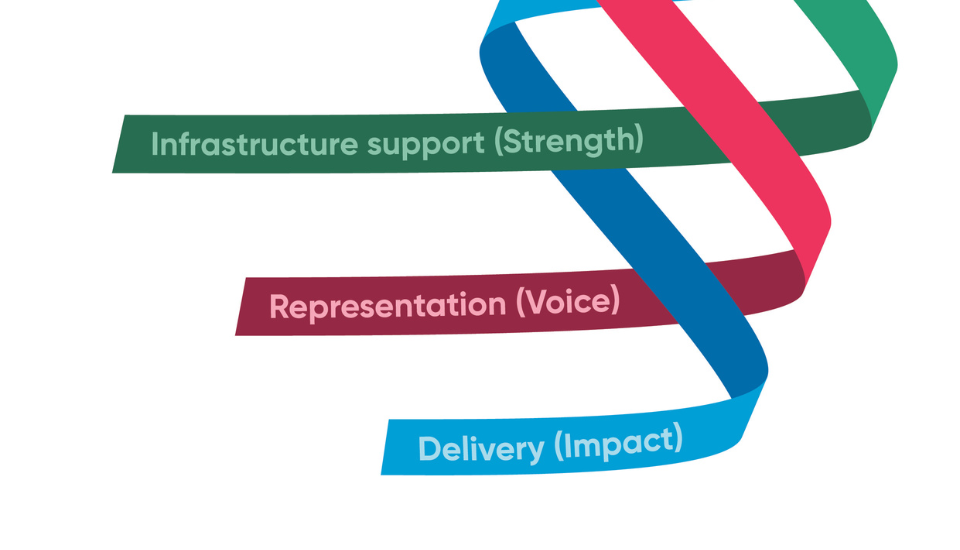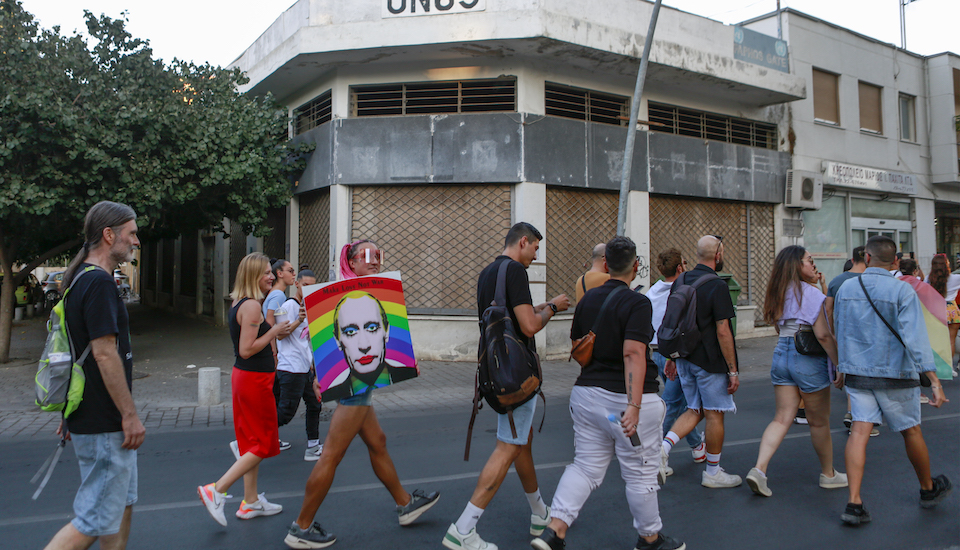In the first part of this two-part Comment article, we argued that there are clear factors that ideally position the VCSFE sector to respond to complex challenges that show up in our communities. Yet this potential isn’t fulfilled. Here, we explore how the sector might align its efforts to liberate the best it has to offer.
The VCFSE sector fulfils different roles and functions. The three broad areas of infrastructure support (strength of the sector), representation (voice of the sector) and delivery (impact of the sector) could be aptly visualised as a triple helix structure. The three strands are complimentary but independent:

Image credit: Ben Clark Design
Without clear separation, things can become very conflicted and territorial and the sector can, at worst, operate in self-destructive cycles. By separating these VCFSE functions we can create a structure more conducive to fairness and accountability. Achieving this, though, is easier said than done, but it is absolutely necessary to realise the sectors full potential as a system player. Let’s start by briefly unpacking these functions.
Infrastructure support
For nascent VCFSE organisations infrastructure support can be a lifeline. This might include advice and guidance on legal structure, funding support, and training. Mark’s own organisation Wellbeing Enterprises CIC has benefitted from infrastructure support from a range of organisations in its early days going back 17 years. It was a valuable resource at this time in the journey. It’s often an undervalued investment, too, at risk of budget cuts, yet organisations that provide such a function play a critical role helping the sector to grow and develop which is precisely what’s needed during times of economic and/or social recession.
Representation
Infrastructure support is a different function to providing representation for the VCFSE sector. The former is a provision to assist individual organisations who are looking to operate effectively, grow and develop. The latter is sector-wide and a collective effort to ensure the sector as a whole is clearly and fairly represented – such as in partnerships and meetings with funders, communities and commissioners, in seeking to influence change and represent the views and experiences of the marginalised. In a sector characterised by high competition for limited resources, this can be problematic. Sector representation ought to be determined democratically with processes and rules which are collectively agreed upon to ensure fairness, but this is generally not the case. To represent the sector without a mandate is undemocratic.
Delivery
Finally, many VCFSE organisations exist specifically to deliver services of some shape or form to address the needs of citizens and community groups. This might include lunch clubs for older people at risk of isolation, sports clubs for young people at risk of gang crime, food banks for the hungry and art groups for those marginalised from education. These VCFSE organisations operate in the service delivery space and their function is different to that of providing infrastructure support. This distinction is important as it respects the different roles and functions that exist in the sector and helps to prevent conflicts of interest and tension, which might also arise if say, one VCFSE organisation were to inappropriately lay claim to represent the voice of the sector.
However, all too often the boundaries between these independent functions get blurred. This serves no one well, and least of all the citizens and communities the sector serves. The sector must resolve this longstanding issue by creating clear blue water between such functions if it wants to be taken seriously by wider stakeholders. Our citizens and communities will be the greatest recipients of this. There are three ways we can achieve this:
1. Commissioning processes do not sufficiently encourage VCFSE partnership or collaborative working. Often winning tenders are grossly oversimplified block contracts that have not adequately responded to the complexity of the challenge at hand. Local commissioning frameworks which incentivise learning and partnerships, and that nurture complex working will deliver helpful behaviours in the sector and importantly solutions that get to the root of the challenge.
2. The lack of democratic participation and representation in the sector means that the diversity of views and opinions are regularly crowded out by those who have historically held power. This needs to change. All organisations ought to have the right to be heard, understood, and respected in the same way that the sector advocates as much for citizens and community groups it supports. We need locally elected representatives who act in the interests of the sector as a whole. Importantly they should be elected through an impartial and independent process. A democratic congress or council in local areas is one way to resolve this. The sector would vote in elected representatives for a specified tenure, who would then be held to account by the sector, ensuring that they advocate only what the sector agrees is a priority through constructive debate and consensus-building with sector players.
3. The lack of clear dividing lines between the functions of infrastructure support, sector representation and service delivery is troubling. The tangled knot of interests that can exist creates conflicts and is a breeding ground for disquiet. If you advocate or provide infrastructure support for the sector, you should not also compete with sector players for public service contracts. This is a conflict of interest. It also doesn’t promote a level playing field as those advocating or providing infrastructure support often enjoy privileged access to public sector networks and intelligence bestowing an unfair advantage. Providing infrastructure support or sector representation is one thing, delivering public service contracts is something altogether different. You can’t deliver more than one of these functions without being conflicted. Separating these distinct functions and creating democratic structures and processes to manage these conflicts is a critical next step in ensuring fairness and transparency in the sector. The public sector ought to play its role in this regard, championing democratic accountability, calling out conflicts of interest and supporting the development of fair and transparent sector governance arrangements.
All of this requires and is predicated on, the cooperation of the public sector, which has an important role to play in helping the VCFSE sector to become the best version of itself so it can step up to the challenges ahead. It’s in all our interests. Of course, strengthening the sector and its voice could in turn be seen as creating a critical challenge to the work of the public sector in general and to locally elected politicians in particular. This is a tension to be aware of. However, the public sector has more to gain than to lose. It can and should advocate and support the democratic structures and processes that are needed to enable the sector to flourish with shared purpose and in greater harmony.
It is no longer sufficient for public sector leaders to stand on podiums waxing lyrical about how we’re all in this together, or that system-working and collaboration are the future if they don’t also play an active role in enabling these very things. After all, the structure of things determine their function and the behaviours at work. Public sector leaders can use the pulleys and levers at their disposal such as contracting, commissioning, and procurement to incentivise new forms of sector democratic representation, participation, and accountability. Furthermore, they ought to call out practices and behaviours which are counterproductive and erode trust. The worse thing of all would be to turn a blind eye or claim that this is for the VCFSE sector to resolve independently. This argument no longer stacks up if public sector leaders mean what they say about thinking like a system. We are all a part of these complex social systems and all have clear and complementary roles to play.
Conclusion
The VCFSE sector’s contribution will be - and should be - of growing importance in future. Not only in terms of ameliorating suffering, but also as a co-architect of system change. To realise the latter, it must go on its own learning journey - alongside others operating within the system - and embody the change it wants to see in the world. Above all we need a level playing field in the VCFSE sector, democratic structures for lively debates and consensus-building, and clear boundaries between the different VCFSE functions; namely, organisations providing infrastructure support, VCFSE leaders elected as representatives, and organisations delivering service contracts. If we are prepared to do the difficult work now, the sector will rise through distributive power. It can walk the walk - which is the most powerful form of advocacy for change in society. The trust and the goodwill cultivated will nourish and energise the sector as it pushes forward with transformational change on a scale never before witnessed, but so urgently needed.

Become an RSA Fellow
The RSA Fellowship is a unique global network of changemakers enabling people, places and the planet to flourish. We invite you to be part of this change.
Related articles
-
Young at heart
Journal
Jonathan Prosser
Becoming a nation with children at its centre in 10 courageous steps.
-
Open RSA knowledge standards
Blog
Alessandra Tombazzi Tom Kenyon
After investigating ‘knowledge commons’, we're introducing our open RSA standards and what they mean for our practice, products and processes.
-
Worlds apart
Comment
Frank Gaffikin
We are at an inflexion point as a species with an increasing need for collaborative responses to the global crises we face.





Be the first to write a comment
Comments
Please login to post a comment or reply
Don't have an account? Click here to register.